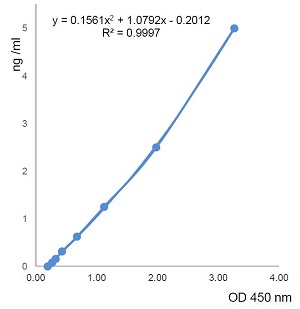
Standard Curve
FNDC4 (human) ELISA Kit
AG-45B-0028
ReactivityCanine, Human, Monkey, Mouse, Rat
Product group Assays
Overview
- SupplierAdipoGen Life Sciences
- Product NameFNDC4 (human) ELISA Kit
- Delivery Days Customer10
- ApplicationsELISA
- Assay Detection Range0.078 to 5ng/ml
- Assay Sensitivity40pg/ml
- CertificationResearch Use Only
- Protein IDQ9H6D8
- Protein NameFibronectin type III domain-containing protein 4
- Scientific DescriptionColorimetric Sandwich ELISA Assay. Detects human FNDC4 in serum, plasma and cell culture supernatant. It cross-reacts with mouse, rat, monkey and dog FNDC4. It does not cross-react with human, mouse or rat FNDC5 / Irisin. Range: 0.078 to 5ng/ml. Sensitivity: 40pg/ml. Samples: Cell Culture Supernatant, Plasma, Serum. Irisin is a recently described exercise-induced hormone secreted by skeletal muscle in mice and humans. Irisin activates beige fat cells (beige cells have a gene expression pattern distinct from either white or brown fat and are preferentially sensitive to the polypeptide hormone irisin). Irisin is cleaved from the type I membrane protein FNDC5 and improves systemic metabolism by increasing energy expenditure. FNDC4 is an ortholog of FNDC5 with 50% identity and 86% similarity compared to Irisin. FNDC4 as well as FNDC5 are extremely well conserved between species. The human FNDC4 gene is highly enriched in liver, brain tissue and adipocytes. FNDC4 is a factor with direct therapeutic potential in inflammatory bowel disease and possibly other inflammatory diseases. Recently, a new role of FNDC4 as a hepatokine has been published. Liver primarily controls the circulating levels of FNDC4 showing tight correlation with insulin sensitivity. In addition, a new orphan adhesion G protein-coupled receptor 116 (GPR116) has been identified as a receptor of FNDC4 in white adipose tissue (WAT), thereby establishing an endocrine FNDC4-GPR116 axis in the control of systemic glucose homeostasis. Moreover, the FNDC4-GPR116 axis is impaired in diabetic patients and therapeutic injections of recombinant Fc-FNDC4 into pre-diabetic mice corrected pre-diabetic hyperglycemia. FNDC4 is a factor with direct therapeutic potential in inflammatory bowel disease and possibly other inflammatory diseases and is a potential biomarker for different inflammatory, metabolic diseases as well as some cancers (e.g. Glioblastoma). - Irisin is a recently described exercise-induced hormone secreted by skeletal muscle in mice and humans. Irisin activates beige fat cells (beige cells have a gene expression pattern distinct from either white or brown fat and are preferentially sensitive to the polypeptide hormone irisin). Irisin is cleaved from the type I membrane protein FNDC5 and improves systemic metabolism by increasing energy expenditure. FNDC4 is an ortholog of FNDC5 with 50% identity and 86% similarity compared to Irisin. FNDC4 as well as FNDC5 are extremely well conserved between species. The human FNDC4 gene is highly enriched in liver, brain tissue and adipocytes. FNDC4 is a factor with direct therapeutic potential in inflammatory bowel disease and possibly other inflammatory diseases. Recently, a new role of FNDC4 as a hepatokine has been published. Liver primarily controls the circulating levels of FNDC4 showing tight correlation with insulin sensitivity. In addition, a new orphan adhesion G protein-coupled receptor 116 (GPR116) has been identified as a receptor of FNDC4 in white adipose tissue (WAT), thereby establishing an endocrine FNDC4-GPR116 axis in the control of systemic glucose homeostasis. Moreover, the FNDC4-GPR116 axis is impaired in diabetic patients and therapeutic injections of recombinant Fc-FNDC4 into pre-diabetic mice corrected pre-diabetic hyperglycemia. FNDC4 is a factor with direct therapeutic potential in inflammatory bowel disease and possibly other inflammatory diseases and is a potential biomarker for different inflammatory, metabolic diseases as well as some cancers (e.g. Glioblastoma).
- ReactivityCanine, Human, Monkey, Mouse, Rat
- Storage Instruction2°C to 8°C
- UNSPSC41116100
- SpeciesHuman
